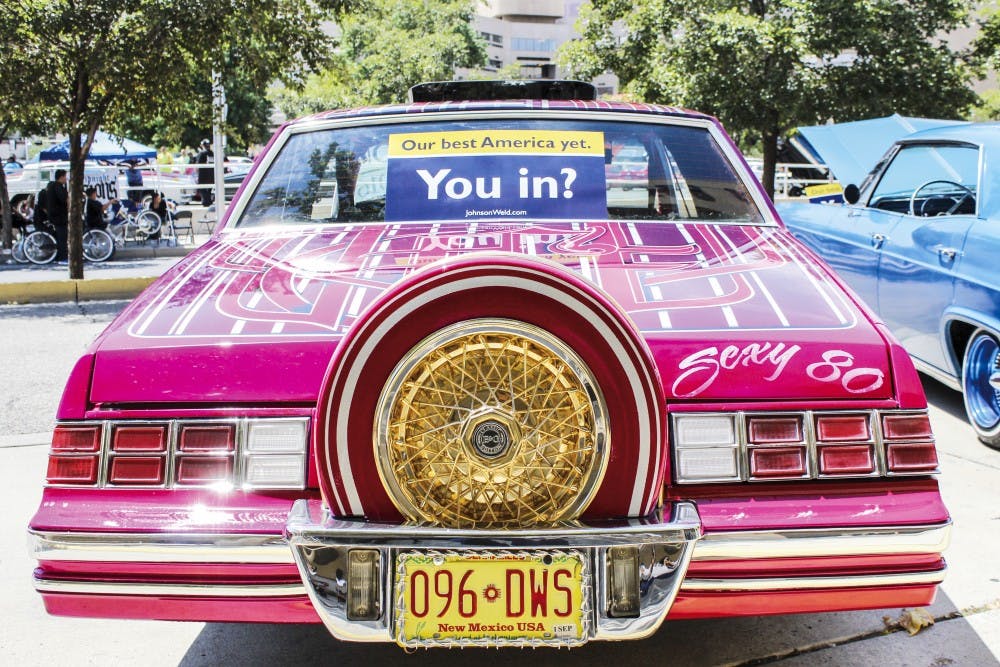Libertarian presidential candidate Gary Johnson is polling at just over six percent across the nation, according to a Real Clear Politics aggregate of 13 polls conducted across the country.
However, some believe his chances of winning are good, as long as Johnson can secure New Mexico’s five electoral votes.
“If Gary Johnson takes the state he has a chance for the presidency,” said Marina Herrera, a junior double-majoring in English and speech and hearing sciences.
Herrera is also the New Mexico State Chair of Youth for the Johnson/Weld campaign.
“By voting for Gary Johnson we can have the same electoral influence as, say, California,” she said.
Herrera hopes neither Clinton nor Trump can clinch the majority of electoral votes.
If neither candidate receives 270 electoral votes, the president will be chosen by the House of Representatives. Only two presidential elections — in 1800 and 1825 — have ended with the House of Representatives electing the president.
If the House does vote on the presidency, each delegate will have a vote they can cast for one of the top three contenders, and Johnson supporters are hopeful for this option.
Many of his supporters believe the traditional political system has hindered the Libertarian candidate’s campaign.
“With a two-party system, people choose who can be in office based on their party,” said Jessamin Ceron, a senior political science and pre-law major.
She expressed interest in having a three-party system that would give more choice to voters.
According to Peter Kierst, a Constitutional law and theory senior lecturer, the two-party system is the result of tradition.
Get content from The Daily Lobo delivered to your inbox
“We have a two-party system because we have single member districts,” he said. “Single member districts are districts in which only one candidate is elected in each district. It’s also known as winner-take-all districts.”
Timothy Krebs, a political science professor at UNM, noted that rules created around elections also tend to favor a two-party system.
“The rules make it hard for third parties to get on the ballot in presidential and down ballot races,” Krebs said.
He also said the winner-take-all election method gives nothing to candidates who come in second or third place, creating further bias for the two-party system.
“What tends to happen is that groups of voters form the largest group possible (tend) to win. That creates a natural fracture of political groups,” Kierst said.
Krebs also spoke to voter tendencies and the way they have shaped election policies, alluding to the philosophy expressed by some that a vote cast for a third-party candidate is a wasted vote.
“Similarly,” he said, “the most talented politicians join one of the major parties as the only viable route to power, starving third parties of strong candidates.”
Some argue there are advantages in the two-party system, Kierst said, including the necessity of incorporating moderate platforms to a campaign in order to appeal to more voters who may be apathetic otherwise.
“The framers were trying to build a government for the long haul,” Kierst said. “They didn’t build for efficiency, they built for durability.”
Kierst also emphasized that the two-party system makes some feel unrepresented.
“When you clump up groups on the ideological spectrum, if the moderate right or moderate left wins, the other side feel unrepresented,” he said. “If 15 percent of the population holds (certain) views, maybe 15 percent of representatives should to.”
Some student-voters agree.
“The two-party system has failed the American people and doesn’t give enough choice,” said Mike Landgraf, a junior economics major and Johnson supporter.
Landgraf said he wants to see the Libertarian Party gain traction after this election, which many see as an opportunity for third-party candidates to make an Election Day impact bigger than the country has seen in recent years.
“I think the Republican Party has dug itself into a hole, and that the Libertarian Party is the fiscally responsible and socially tolerable alternative,” Landgraf said.
Kierst said he thinks Libertarians need a more grassroots movement to be an established party.
“The presidential election is not the place to build a third party,” he said, noting that in order to create a strong Libertarian party, delegates need to be elected at the local level first.
Nonetheless, Landgraf said he will be voting for Johnson based on his values.
“I’d rather vote for my conscience than the lesser of two evils, which has been perpetuated on the American people for the last decade,” he said.
Like Landgraf, Logan Jeffers, a junior biology major, is supporting a third-party candidate — Jill Stein of the Green Party — despite the steep odds against her.
Real Clear Politics estimates Stein is polling at just over 2.5 percent.
“I believe we should vote out of our values, not our fears,” Jeffers said. “The electoral system and democracy has been undermined by voting out of our fears.”
Brendon Gray is a news reporter for the Daily Lobo. He can be reached at news@dailylobo.com or on Twitter @notgraybrendon.






